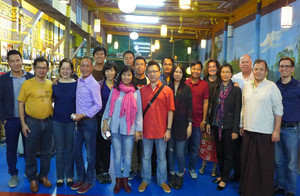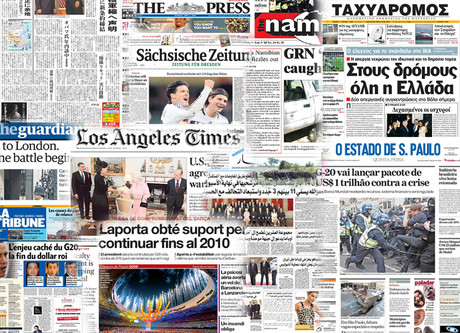As the global media industry faces such challenges as the move towards digital, gender equality and press freedom, it’s increasingly essential to make sure no media organization gets left behind.
WAN-IFRA has dedicated itself to media advocacy for over six decades, providing assistance and expertise to professionals around the world. But it wasn’t until a few years ago that the organization officially launched its Brain Trust initiative – to bring together senior executives from around the world to discuss the challenges facing the press, and provide training and support.
When the Brain Trust became official in 2012, the group consisted of primarily Canadian journalists from the Toronto Star. Now, four years later, there are more than 20 senior media executives who are dedicating their time to mentoring, development and advocacy to such countries as Botswana, Malawi, Egypt, South Africa, Tunisia and Myanmar.
Additionally in 2012, WAN-IFRA created a framework for its Brain Trust – the Media Professionals Program (MPP) – to bolster independent media through training and networking. This January, the MPP headed to Myanmar, where 20 senior media professionals from Cambodia, Myanmar and Vietnam descended on Yangon for five days of workshops on revenue generation, digital strategy, and audience growth and retention.
Jen Teo is the Director of the MPP from WAN-IFRA’s Singapore office and developed the program by looking at the key challenges facing the participating news organizations. “The main challenges involved generating revenue in a digital world, educating the digital team from an editorial perspective, and capacity building,” says Teo. “The mission of the MPP is to raise the quality of journalism in this digital world, where not just skill sets but also mindsets are changing.”
The overall education of journalists was a top concern for participants, where many news organizations in the region don’t have the resources for training and development.
“Media professionals in Myanmar are facing a lack of professional training because we do not have proper schools,” says participant Myo Hlaing Aung, the General Manager of Information Matrix, which publishes Myanmar’s 7 Day Daily. “Although there are some schools now in Yangon and some scholarship programs from other organizations, we still need to develop professional journalism in Myanmar.”
Teo says many news organizations are also struggling with a decline in readership – putting more pressure to increase digital offerings. All of these challenges have crystallized why, says Teo, “the Brain Trust is a critical, valuable aspect of this program.”
Three Brain Trust members were chosen to travel to Yangon, including Kirk MacDonald, EVP Sales and Sales Development of Digital First Media, Michael Cooke, Editor-in-Chief of the Toronto Star, and Greg Barber, Director of Digital News Projects at The Washington Post. Barber says this first experience with the Brain Trust was tremendous.
“It was great getting to meet journalists from places I don’t usually meet them,” he says, “and to learn about the challenges they face on a daily basis – versus my experience of being a journalist who has spent his life in the US.”
Barber says he was surprised that the restrictions for journalists in the participating countries weren’t what he thought they would be, and that everyone was willing to explore all subject matters.
Participant Le Quoc Minh, Editor-in-chief of VietnamPlus, says that while listening to the dynamic Brain Trust speakers, he was aware that newsrooms in Vietnam or Myanmar often present different challenges from those in Toronto or Washington.
Still, cultural differences didn’t take away anything from his experience, he says. If anything, it enhanced it. “This initiative is really wonderful as it helps us to dig deep into our problems with the assistance and supervision of world-class experts,” says Le Quoc.
And the benefits for MPP participants don’t stop at the Yangon workshop. They will also receive 20 hours of onsite consulting from a Brain Trust mentor between February and March as well as participation in annual media events, such as the recent Digital Media Asia 2015 in Hong Kong in November and the upcoming Publish Asia 2016 in Manila in March.
As the weeklong events in Yangon came to a close, Teo says Brain Trust members expressed having learned as much or more from participants as participants learned from them. Barber says this was definitely true for him.
“I’ve had experiences that they might not have had and vice versa,” he says. “This experience was mutually beneficial.”
It’s certainly good news for an initiative that WAN-IFRA hopes will turn into a 3-year program for participants in Cambodia, Vietnam and Myanmar, where the group will continue to benefit from Brain Trust members’ support, training and experience.





